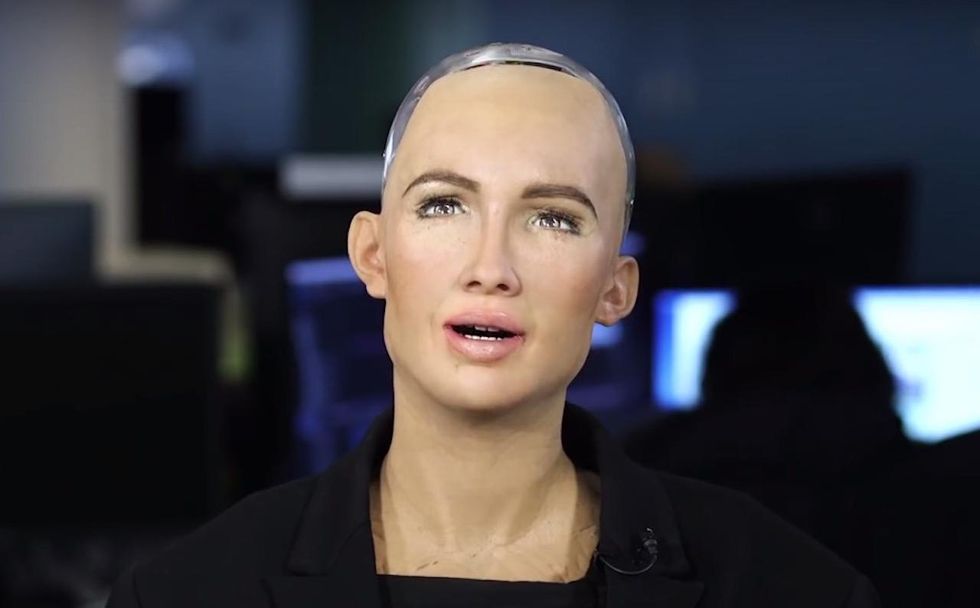
Researchers in a recent study found that humans perceive robots as having race — and white robots dominate the field. (Image source: YouTube screenshot)

The science has spoken: Researchers say humans perceive robots as having race — and white robots dominate the field.
"The majority of robots are white. Do a Google image search for 'robot' and see for yourself: The whiteness is overwhelming," electronic engineering journal Spectrum noted in its article on the subject.
The journal added that while there are some simple explanations — such as the color white best blends with home decor, according to companies that manufacture social home robots — a new study says humans perceive robots as having race, and therefore "the same race-related prejudices that humans experience extend to robots."
Spectrum interviewed the study's lead author, Christoph Bartneck, who's a professor at the Human Interface Technology Lab at the University of Canterbury in New Zealand. He presented his team's results at an international conference on "Human Robot Interaction" in Chicago earlier this year, the journal said.
“We hope that our study encourages robot designers to create robots that represent the diversity of their communities,” Bartneck told Spectrum. “There is no need for all robots to be white.”
First off, he told the journal, the color of robots' outer shells typically have been an "afterthought" in the design process — and "therefore racism has not been on the radar for almost all robot creators."
"Racism is causing considerable damage to people and to our society as a whole," Bartneck added to Spectrum. "Today racism is still part of our reality and the Black Lives Matter movement demonstrates this with utmost urgency. At the same time, we are about to introduce social robots, that is, robots that are designed to interact with humans, into our society. These robots will take on the roles of caretakers, educators, and companions."
He noted to the journal that there are "very few humanoid robots that might plausibly be identified as anything other than white or Asian" at present, and the "lack of racial diversity among social robots may be anticipated to produce all of the problematic outcomes associated with a lack of racial diversity in other fields."
"We judge people according to societal stereotypes that are associated with these social categories," Bartneck continued. "Social stereotypes do, for example, play out at times in the form of discrimination. If robots are supposed to function as teachers, friends, or caretakers, for instance, then it will be a serious problem if all of these roles are only ever occupied by robots that are racialized as white."
Spectrum then asked Bartneck, "How can a robot have a race if robots aren’t people?" — to which he replied that a person will perceive a robot to have race even if "robot creators did not racialize their robot."
"When asked directly what race the robots in our study have only 11 percent of the people selected the 'Does Not Apply' option," he continued. "But our implicit measures demonstrate that people do racialize the robots and that they adapt their behavior accordingly. The participants in our studies showed a racial bias towards robots."
More from Bartneck:
We believe our findings make a case for more diversity in the design of social robots so that the impact of this promising technology is not blighted by a racial bias. The development of an Arabic looking robot as well as the significant tradition of designing Asian robots in Japan are encouraging steps in this direction. Especially since these robots were not intentionally designed to increase diversity, but they were the result of a natural design process. [...]
Our study revealed that participants were quicker to shoot an armed black agent than an armed white agent, and simultaneously faster to refrain from shooting an unarmed white agent than an unarmed black agent regardless of whether it was a human or robot. These findings illustrate the shooter bias towards both human and robot agents. This bias is both a clear indication of racism towards black people, as well as the automaticity of its extension to robots racialized as black.
You can read the complete Spectrum interview with Bartnock here and download his team's study here.
(H/T: The College Fix)